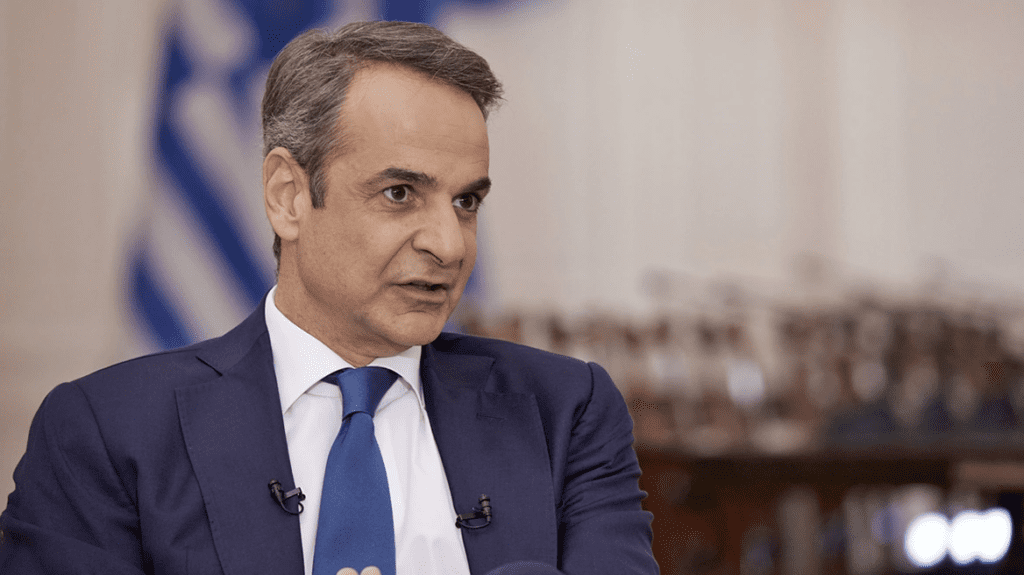Prime Minister deflects responsibility regarding Tempe tragedy and femicide in front of police station

In response to inquiries about potential tampering with conversations related to the Tempe train disaster, Prime Minister Kyriakos Mitsotakis acknowledged the possibility of alterations but firmly denied any government involvement. Addressing another serious issue, the femicide outside the Agioi Anargyroi Police Station, Mitsotakis dismissed the notion of political accountability for Minister for Citizen Protection Michalis Chrysochoidis, arguing that accepting such a premise would lead to constant changes in ministerial positions.
Mitsotakis emphasised that the justice system possesses all relevant audio recordings and is tasked with investigating their leak concerning the Tempe train disaster. He questioned the rationale behind alleged attempts to conceal facts about the incident, such as unfounded claims that the train was transporting xylene or explosives, asserting that there was no cover-up and highlighting his confidence in the absence of such actions. Mitsotakis framed the tragedy as a confluence of human error and systemic issues within public administration, dismissing the idea of blaming stationmasters alone. Acknowledging the public’s scepticism and mourning over the unavailability of comprehensive safety systems, he reaffirmed his commitment to enhancing railway safety, urging patience to allow the judicial process to unfold.
He addressed “conspiracy theories” surrounding the Tempe train disaster, particularly the use of gravel to stabilise the ground for crane operations to lift derailed passenger cars. He clarified that the decision to use gravel was made operationally on the field due to the presence of broken wagons and the potential of finding deceased individuals beneath them. Mitsotakis expressed his displeasure with the ease with which such conspiracy theories proliferate, emphasising that the most effective means of countering these narratives is through the judicial process, underscoring a commitment to transparency and truth.
Mitsotakis conceded that the government’s initial handling of conspiracy theories following the Tempe train disaster was lacking. He admitted the government failed to promptly and effectively counter the false narratives propagated by the opposition leader and Mr. Velopoulos, describing the accusations as baseless. Mitsotakis emphasised the importance of distinguishing between a politician’s parliamentary immunity and their legal accountability under Article 86 of the constitution. Despite the opposition’s preliminary accusations, Mitsotakis noted the absence of any formal indictment. He stressed that if there are allegations of manslaughter with intent, these should be formally documented and presented to Parliament for due consideration, reinforcing the need for procedural correctness and transparency in addressing such serious charges.
On the topic of police patrol cars being used for transporting citizens at risk, Mitsotakis highlighted a dual issue within the state apparatus. He acknowledged the prevalence of apathy, alongside instances where officers have misused patrol cars for purposes akin to taxis. Mitsotakis pointedly critiqued this misuse, yet, in populist fashion, also noted the positive actions of police officers during emergencies, such as their efforts to evacuate the elderly in fire situations. His remarks sparked discussion, especially his comments on the misuse of police vehicles, suggesting a need for clear delineation between the roles and responsibilities of law enforcement, including their duty to safeguard citizens in distress.
“We require stricter protocols for actions taken following the report of a violence incident,” he continued. Regarding the panic button, he added, “It’s a reality, an important innovation,” although this perspective faces opposition from both women directly affected and the legal community.
Reflecting on the femicide in Agioi Anargyroi, the Prime Minister viewed it as a stark reminder of the potential setbacks in the process of streamlining and reforming public services, emphasising the need for accelerated progress. He acknowledged the identification of understaffed departments within the police force, juxtaposed with an excess of officers assigned to guard high-ranking officials. The reallocation of these officers, described as a “withdrawal,” involves their reassignment to different departments and roles, aiming to address staffing shortages more effectively.
Furthermore, he unequivocally stated that there is no political liability for Minister Michalis Chrysochoidis in relation to the incident, arguing that accepting such a premise would lead to an unsustainable cycle of changing ministers over individual incidents.
Discussing initiatives to combat intra-school violence, the Prime Minister highlighted the launch of a platform addressing this issue as a positive step forward. He stressed the importance of fostering an environment where children feel safe to report bullying, drawing on his personal experience as a father of three. Emphasising the necessity of providing both love and boundaries to children, he suggested that actions must have consequences, although he pointed out these consequences are not intended to be punitive but rather to establish a clear set of rules.
“We’re not aiming to punish children, but to define boundaries. There appears to be a desire from some quarters, notably voiced by the Left, for children to avoid facing the repercussions of their actions,” he remarked. Further, he mentioned the effective role of increased police visibility in areas with a history of teenage violence, citing the northern suburbs in Athens as an example where police intervention served as a preventive measure.
“During this four-year term, we must undertake significant reductions in the state apparatus. If the previous four years were about managing crises, we are now moving into more profound territory. The effectiveness of the policies implemented over these four years will be the basis of my judgment,” he declared, indicating a pivotal shift in focus towards restructuring and possibly streamlining government operations as a critical evaluation point of his tenure.
______________________________________________
Are you seeking news from Greece presented from a progressive, non-mainstream perspective? Subscribe monthly or annually to support TPP International in delivering independent reporting in English. Don’t let Greek progressive voices fade.
Make sure to reference “TPP International” and your order number as the reason for payment.